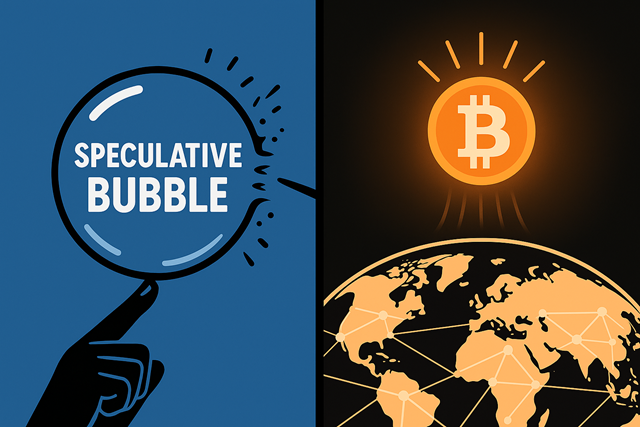Is Bitcoin a Bubble? Why It’s Different from Tulip Mania or Tech Hype | Bitcoin Myths #4
Why Some People Still Think Bitcoin Is a Bubble
Some people still think Bitcoin is just another bubble waiting to pop. You’ve probably seen the comparisons to tulip mania or the dot-com crash. These stories get clicks, but they overlook what sets Bitcoin apart. It’s not built on hype. It’s built on scarcity, utility, and a growing base of people who understand what it represents. In this article, we’ll look at why the bubble narrative keeps coming back, and why it doesn’t hold up to real scrutiny.
Is Bitcoin a Bubble or a Breakthrough?
No. While Bitcoin has experienced volatility, it has repeatedly recovered and reached new highs. A true speculative bubble bursts and disappears. Bitcoin continues to grow in utility, adoption, and infrastructure, which are key signs of a durable, evolving technology. Its value comes not from hype, but from scarcity, decentralization, and real-world use.
What Does ‘Is Bitcoin a Bubble’ Really Mean?
Is Bitcoin a Bubble?
Bitcoin isn’t backed by a government or a physical commodity like gold. It doesn’t need to be. Its value comes from the network itself — from its ability to provide global, permissionless money with a fixed supply and no central authority. That is what makes Bitcoin different. That is what gives it utility.

Bitcoin has experienced significant price corrections in 2011, 2013, 2017, and 2021, yet it continues to recover and reach new adoption milestones. This pattern suggests resilience, not collapse. Speculative bubbles typically burst and vanish. Bitcoin persists because of its fixed rules and growing utility.
In Nigeria, peer-to-peer Bitcoin trading has soared as the local currency weakens and banking restrictions tighten. Despite central bank bans, adoption continues through grassroots channels.
In Argentina, citizens are turning to Bitcoin as a hedge against inflation, which exceeded 211% in early 2024. Crypto adoption is growing as people seek to escape a collapsing fiat system.

Did You Know? Bitcoin’s scarcity is hardcoded. There will only ever be 21 million coins, and no one — not governments, banks, or developers — can change that.
Bitcoin’s value comes from scarcity, decentralization, and verifiable utility — not from promises or fiat guarantees.
Leading economists and researchers, including studies from the Federal Reserve and Bank for International Settlements, have acknowledged Bitcoin’s growing role in the global financial landscape. Its resilience, decentralization, and scarcity continue to set it apart.
Expert Insight on Whether Bitcoin Is a Bubble
Bitcoin is valuable because it does something no other asset can: provide global, permissionless money with fixed supply and no central control.
– Saifedean Ammous, The Bitcoin Standard
From Scarcity Comes Abundance
That is the promise. That is the power.
That is Bitcoin.
Still on the fence about Bitcoin’s future?
You’re not alone. But the more we ask questions, the more we uncover.
If you’re serious about understanding Bitcoin beyond the headlines, explore the full Bitcoin Myths series
